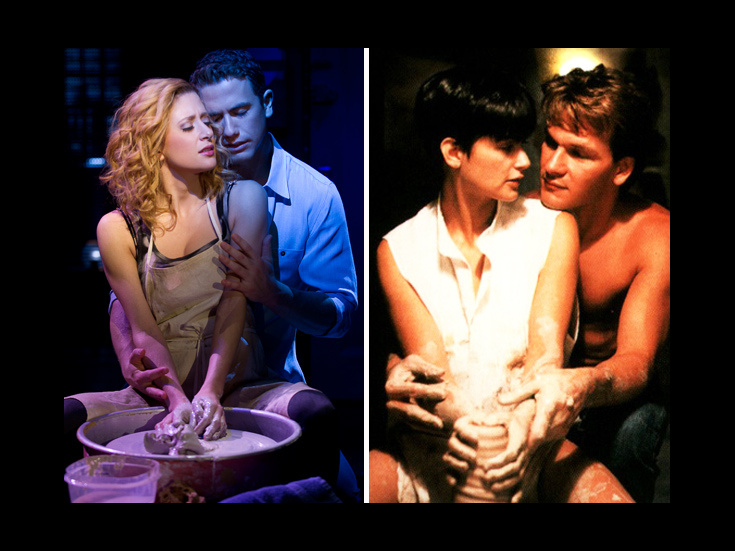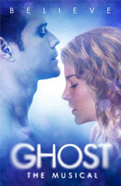How Ghost Took a Spiritual Journey to Become a Spectacular Stage Musical

A Haunting Idea
The 1990 film Ghost is as much a comedy as a romance, but it began life as a much darker project. “I had wanted to do a movie about ghosts for 10 years, and to tell it from the side of the ghost, but none of my ideas worked,” screenwriter Bruce Joel Rubin told the New York Times in 2001. “Then one night I saw Hamlet, and there was Hamlet's father saying, ‘Avenge my death.’ And I thought, there's the film.” Further inspiration came from an overheard conversation. “I remember being in a drugstore and hearing the phrase, ‘You can't take it with you,’ Rubin said, “and I thought, ‘Yeah, you can—you can take the love.’”
So Ghost took a romantic turn, centering on the love between a young banker named Sam and his girlfriend, Molly. They are ripped apart when Sam is murdered and he becomes stuck in this world as a ghost, able to see Molly but unable to finally tell her “I love you.” When he finds out Molly is in danger, Sam enlists fraud psychic Oda Mae Brown to contact her.

A New Direction
Rubin was dismayed when he found out that Jerry Zucker, known for his work on broad comedies like Airplane!, wanted to direct. “I wanted Milos Forman or Stanley Kubrick," the screenwriter said, but a meeting with Zucker revealed that they were more on the same page than he knew.
“What I loved about the script, right from the beginning, was that it was written by someone who really believes in the spiritual world and takes these issues seriously," Zucker said. But Zucker’s comedy background did come in handy in the 19 revisions of the script they would eventually do together. "I felt it needed more twists and turns," Zucker explained. "It needed to keep moving. All those zany comedies have instilled a sense of pace in me.”
After early trouble casting the leading man (“Nobody liked the idea of playing a dead man,” Rubin said) Ghost snagged Patrick Swayze, who had become a bona fide heartthrob in Dirty Dancing three years earlier. Demi Moore was cast as his Molly, with Whoopi Goldberg as psychic Oda Mae and Tony Goldwyn as Sam’s co-worker Carl.

A Pot Heard ‘Round the World
Reviews were mixed after Ghost hit theaters in July 1990, but the chemistry between Swayze and Moore was undeniable, as was their soon-to-be-infamous love scene. The clay-covered couple got busy behind a potter’s wheel, to the strains of the Righteous Brothers’ “Unchained Melody.” The film went on to earn over $500 million worldwide.
While fans couldn’t get enough of the steamy central couple, the film’s critical darling was Goldberg, who earned high praise for playing the eccentric medium. The film was nominated for five Academy Awards in 1991, including Best Picture, but it was Goldberg and Rubin who ultimately walked away with the film’s two trophies, for Best Supporting Actress and Best Original Screenplay, respectively.
A Musical Materializes
When theater director Matthew Warchus was approached about bringing Ghost to the stage as a musical, it was screenwriter Rubin’s turn to do the convincing. “Initially I wasn’t excited about it,” Warchus told Broadway.com in London. “I was also concerned that there’s something a little cheesy about it. Everybody thinks they know Ghost. It was only because of a meeting I had with Bruce Joel Rubin, who was so excited about how theater could embrace and fly with his story.”
Part of that theatrical embrace came in the form of stage magic, both old-fashioned and new-fangled, that helped recreate some cinematic elements necessary for the story—ghost Sam can walk through walls, after all. “The principle I have is, ‘There’s nothing you can’t do on stage,’” Warchus said. “Some of [Ghost’s techniques] are very old; some of them are cutting-edge technology.”

A Melody, Unleashed
Rubin himself adapted his screenplay for the musical, and rock stars Dave Stewart of The Eurythmics and Glen Ballard, songwriter for Michael Jackson, Alanis Morissette and more, were enlisted to write the score. “When we met Bruce, I think we both warmed to him straightway and him to us," Stewart told the Associated Press in 2012,” and both he and Ballard were attracted to the story. “It’s a love story, it has the afterlife, it has action, it has comedy,” Ballard told Broadway.com “It has almost every single thing you could want in terms of emotional range, when you’re diving into something.”
British TV star Richard Fleeshman and Broadway vet Caissie Levy (Hair) landed the plum roles created by Swayze and Moore, and were very conscious of the shoes they were filling. “[Ghost] is so iconic and you’re handling things that people hold very dear,” Fleeshman told Broadway.com, “We just wanted to do it justice.” In a Broadway.com interview, Levy remarked that the screen-to-stage pressure was removed largely by director Matthew Warchus' approach. "He likes to talk about turning a story into a musical, not a movie into a musical,” she said “We’re honoring the original story.”

A Stage Spectre
Ghost premiered at the Manchester Opera House in the spring of 2011, but it already had a West End berth booked at the Piccadilly Theatre. The show transferred to the London stage in June 2011, and from day one there was not a dry eye in the house. “It’s odd that the only barometer of how well a show has gone is how loud the sniffles are,” Fleeshman joked on his opening night in London.
That emotional resonance—as well as stars Fleeshman and Levy—stayed with the musical as it headed to Broadway, where it began performances at the Lunt-Fontanne Theatre in March 2012. On an appearance on Broadway.com’s Show People, Levy also remarked on seeing tear-streaked faces in the audience, but that may be exactly what Warchus intended. “If you make an audience laugh, they like you,” the director pointed out. “If you make an audience cry, they love you.”
